to download BETELNUT BISNIS study guide - Ronin Films
to download BETELNUT BISNIS study guide - Ronin Films
to download BETELNUT BISNIS study guide - Ronin Films
You also want an ePaper? Increase the reach of your titles
YUMPU automatically turns print PDFs into web optimized ePapers that Google loves.
the New Guinea islands. It may have<br />
been used by white English speakers<br />
attempting <strong>to</strong> trade, gain information<br />
or instruct house servants and plantation<br />
workers, but it rapidly became the<br />
language of New Guineans speaking<br />
<strong>to</strong> each other, especially where New<br />
Guineans from different languages<br />
were living close <strong>to</strong>gether and had <strong>to</strong><br />
communicate with each other. Among<br />
New Guineans, Tok Pisin was soon the<br />
language of the plantation labourers,<br />
the police, the prisons and the <strong>to</strong>wns.<br />
Even during the German administration<br />
of New Guinea from 1884 <strong>to</strong> 1914 Tok<br />
Pisin was a common language, and<br />
when the Australians arrived in 1914<br />
they proclaimed their control <strong>to</strong> the<br />
New Guineans of Rabaul in what they<br />
thought was Tok Pisin.<br />
Although much of the vocabulary of Tok<br />
Pisin has been derived from English,<br />
many words from other languages<br />
(including, of course, from Papua New<br />
Guinea) have been included. The rules<br />
of grammar differ from English and<br />
have been influenced by Papua New<br />
Guinean languages, and pronunciation<br />
has largely been determined by Papua<br />
New Guineans. English speakers,<br />
when they first hear Tok Pisin, cannot<br />
recognize most words derived from<br />
English and take some time <strong>to</strong> grasp<br />
the grammar.<br />
There are now thousands of Papua<br />
New Guineans growing up away from<br />
their home areas and for many of them<br />
Tok Pisin is their first language. Tok<br />
Pisin is an official language of Papua<br />
New Guinea, is often heard on radio,<br />
and many politicians use it <strong>to</strong> reach the<br />
maximum number of listeners. Used by<br />
fluent speakers, Tok Pisin can be rich in<br />
metaphors and colloquial expressions,<br />
and is often preferred for jokes and<br />
anecdotes.<br />
National Issues<br />
Although Betelnut Bisnis is centred on<br />
the daily lives of individuals, viewers are<br />
reminded of national issues that may at<br />
any time impinge on those lives.<br />
1. Politics and Corruption<br />
The scenes of the political rally reveal<br />
something of Papua New Guinea’s<br />
turbulent democracy. Rare among<br />
similarly ex-colonial states, Papua New<br />
Guinea has held regular elections and<br />
governments have changed as a result<br />
of these elections. People are keen <strong>to</strong><br />
participate in the democratic process<br />
and many aspire <strong>to</strong> be candidates, but<br />
the comments of the bystanders reveal<br />
that they expect little from their elected<br />
leaders. They know they will be promised<br />
roads, bridges, schools and hospitals,<br />
but seem <strong>to</strong> accept that government<br />
services will continue <strong>to</strong> decline.<br />
They see their politicians as corrupt or<br />
ineffective, and over half of them will be<br />
rejected at the next election.<br />
2. HIV/AIDS<br />
On the bus <strong>to</strong> Lae, Lukas travels with<br />
a theatre troupe. Later they are seen<br />
performing at the market: they entertain<br />
but have an explicit aim <strong>to</strong> encourage<br />
the use of condoms. It is the film’s<br />
reminder that in Papua New Guinea<br />
HIV/AIDS is already a serious problem,<br />
and there are fears of it becoming the<br />
scourge that it is in parts of Africa.<br />
Much transmission is among heterosexuals;<br />
parents of young children are<br />
casualties, and the health system is ill<br />
equipped <strong>to</strong> provide the necessary long<br />
term care or those drugs that require<br />
careful moni<strong>to</strong>ring. In a country where<br />
many are illiterate, few newspapers<br />
circulate and there is little television<br />
ISSUE 36 SCREEN EDUCATION<br />
6


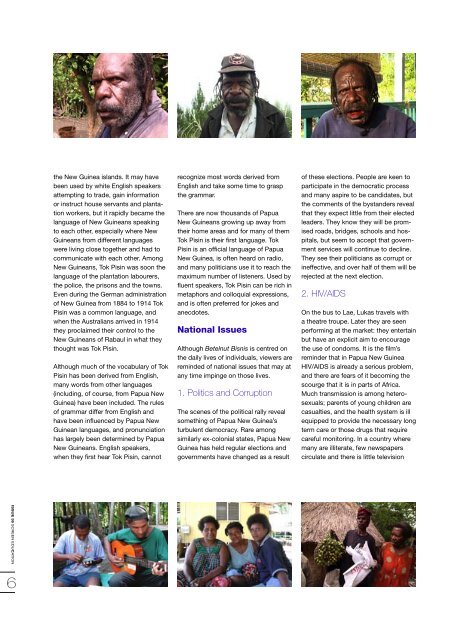
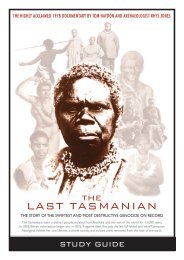



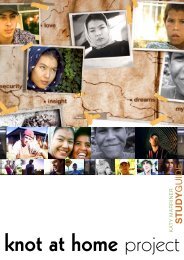

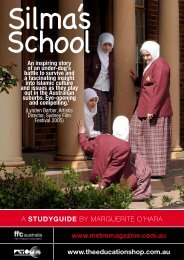
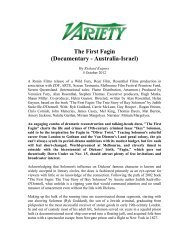

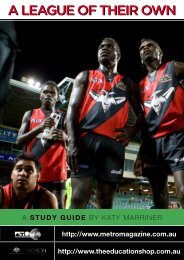
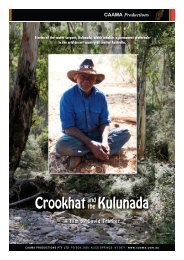
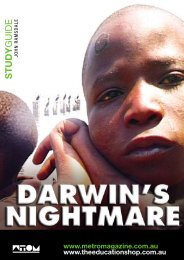
![to download FROHE OSTERN! [HAPPY EASTER!] - Ronin Films](https://img.yumpu.com/33740736/1/184x260/to-download-frohe-ostern-happy-easter-ronin-films.jpg?quality=85)

